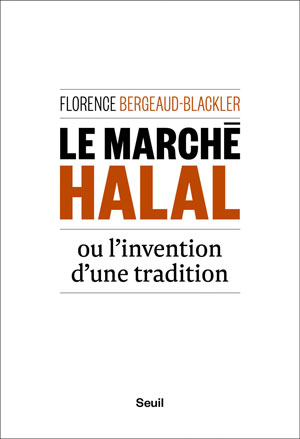Le Marché halal ou l’invention d’une tradition
Florence Bergeaud-Blackler
Seuil, 2017, 272 p.
 Du simple rituel d’abattage au tourisme halal, en passant par les aliments, les médicaments et la mode, le marché halal s’étend sur tous les continents. La liberté d’interprétation des textes dont bénéficiaient les autorités religieuses traditionnelles a été peu à peu remplacée par un espace normatif où le fidèle n’aurait que le choix de chercher le halal et de fuir le non licite. Et la surveillance qui s’exerce sur les produits charia-compatibles par le biais d’intermédiaires mi-marchands mi-religieux s’applique désormais aussi aux conduites de leurs acheteurs.
Du simple rituel d’abattage au tourisme halal, en passant par les aliments, les médicaments et la mode, le marché halal s’étend sur tous les continents. La liberté d’interprétation des textes dont bénéficiaient les autorités religieuses traditionnelles a été peu à peu remplacée par un espace normatif où le fidèle n’aurait que le choix de chercher le halal et de fuir le non licite. Et la surveillance qui s’exerce sur les produits charia-compatibles par le biais d’intermédiaires mi-marchands mi-religieux s’applique désormais aussi aux conduites de leurs acheteurs.
Qu’est-ce qui a rendu possible un tel élargissement du « système halal », faisant de tout fidèle musulman un consommateur, et de l’Umma une puissance économique ? Du cœur des abattoirs jusqu’aux comités normatifs où se décident nos politiques économiques, ce livre brillant et passionnant raconte la rencontre improbable entre deux utopies de la fin du XXe siècle, le fondamentalisme islamique et le néolibéralisme. Montrant que la récente invention du marché halal n’aurait pas été possible si les intérêts marchands n’étaient pas passés avant la neutralité de l’Etat et la liberté religieuse, il propose également un décryptage des enjeux des controverses qui divisent la société française : l’abattage rituel et le bien-être animal, les repas halal dans les institutions publiques ou les entreprises, etc.
From the simple ritual of slaughter to halal tourism, through food, medicines and fashion, the halal market extends on all continents. The freedom of interpretation enjoyed by traditional religious authorities is gradually replaced by a normative space where the faithful would have only the choice to seek ’halal’ and shun what is ’haram’. The contole of sharia-compatible products through intermediaries is now also applied to the behavior of their buyers.
What has made possible such an expansion of the "halal system", making every Muslim a consumer, and the Umma an economic power? From the heart of the slaughterhouses to the normative committees where our economic policies are decided, this brilliant and exciting book tells the unlikely encounter between two utopias of the end of the twentieth century, Islamic fundamentalism and neoliberalism. Showing that the recent invention of the halal market would not have been possible if market interests had not passed before the neutrality of the state and religious freedom, it also proposes a deciphering of the stakes of the controversies that divide the European (in particular French) society: Ritual slaughter and animal welfare, halal meals in public institutions or enterprises, etc. This book proposes an innovative and deeply documented survey that should be a landmark.
Florence Bergeaud-Blackler, anthropologue, chargée de recherche au CNRS à l’Institut de recherches et d’études sur le monde arabe et musulman (Aix-Marseille Université), est une spécialiste reconnue du marché halal en Europe dont elle a suivi l’évolution depuis plus de vingt ans.